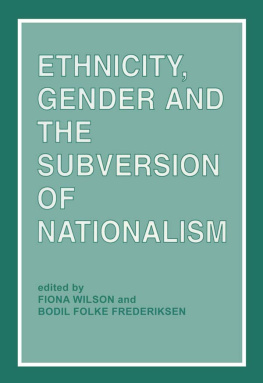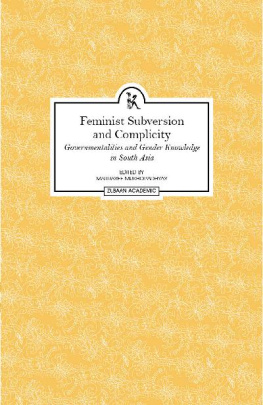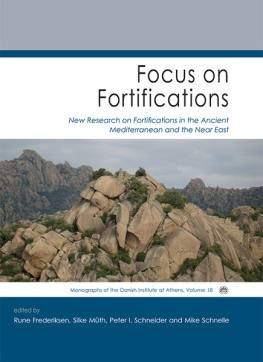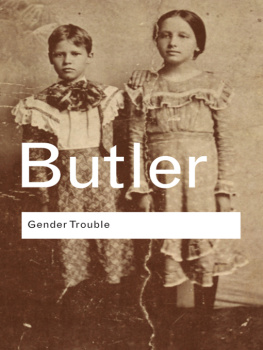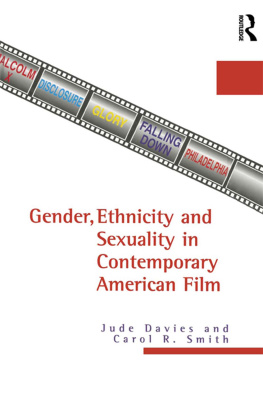Bodil Folke Frederiksen - Ethnicity, Gender and the Subversion of Nationalism
Here you can read online Bodil Folke Frederiksen - Ethnicity, Gender and the Subversion of Nationalism full text of the book (entire story) in english for free. Download pdf and epub, get meaning, cover and reviews about this ebook. year: 2014, publisher: Routledge, genre: Politics. Description of the work, (preface) as well as reviews are available. Best literature library LitArk.com created for fans of good reading and offers a wide selection of genres:
Romance novel
Science fiction
Adventure
Detective
Science
History
Home and family
Prose
Art
Politics
Computer
Non-fiction
Religion
Business
Children
Humor
Choose a favorite category and find really read worthwhile books. Enjoy immersion in the world of imagination, feel the emotions of the characters or learn something new for yourself, make an fascinating discovery.
- Book:Ethnicity, Gender and the Subversion of Nationalism
- Author:
- Publisher:Routledge
- Genre:
- Year:2014
- Rating:4 / 5
- Favourites:Add to favourites
- Your mark:
- 80
- 1
- 2
- 3
- 4
- 5
Ethnicity, Gender and the Subversion of Nationalism: summary, description and annotation
We offer to read an annotation, description, summary or preface (depends on what the author of the book "Ethnicity, Gender and the Subversion of Nationalism" wrote himself). If you haven't found the necessary information about the book — write in the comments, we will try to find it.
Ethnicity, Gender and the Subversion of Nationalism — read online for free the complete book (whole text) full work
Below is the text of the book, divided by pages. System saving the place of the last page read, allows you to conveniently read the book "Ethnicity, Gender and the Subversion of Nationalism" online for free, without having to search again every time where you left off. Put a bookmark, and you can go to the page where you finished reading at any time.
Font size:
Interval:
Bookmark:
the Subversion of
Nationalism
and
BODIL FOLKE FREDERIKSEN

2 Park Square, Milton Park, Abingdon, Oxon, OX14 4RN
711 Third Avenue, New York, NY 10017
A catalogue record for this book is available
from the British Library
Wilson and Bodil Folke Frederiksen
p. cm.
Published also as v. 6, no. 2 of The European journal of development research.
Includes bibliographical references.
ISBN 0-7146-4155-3 (pbk)
1. Ethnicity Developing countries. 2. Sex role Developing countries. 3. Nationalism Developing countries. 4. Women in development Developing countries. 5. Women Developing countries Social conditions. I. Wilson, Fiona. II. Frederiksen, Bodil Folke, 1943-
GN495.6.E885 1995
305.8dc20 94-43142
CIP
Subversion of Nationalism of the European Journal of Development Research, Vo1.6.,
No.2, December 1994 published by Frank Cass & Co. Ltd.
stored in a retrieval system, or transmitted in any form, or by any means,
electronic, mechanical, photocopying, recording, or
otherwise, without the prior written permission of the publisher.
| Fiona Wilson and Bodil Folke Frederiksen |
| Verena Stolcke |
| Fiona Wilson |
| Preben Kaarsholm |
| Karen Tranberg Hansen |
| Bodil Folke Frederiksen |
| Philip Raikes |
| Thomas Blom Hansen |
| Neil Webster |
| Ninna Nyberg Srensen |
Ethnicity, Gender and the Subversion of Nationalism
Font size:
Interval:
Bookmark:
Similar books «Ethnicity, Gender and the Subversion of Nationalism»
Look at similar books to Ethnicity, Gender and the Subversion of Nationalism. We have selected literature similar in name and meaning in the hope of providing readers with more options to find new, interesting, not yet read works.
Discussion, reviews of the book Ethnicity, Gender and the Subversion of Nationalism and just readers' own opinions. Leave your comments, write what you think about the work, its meaning or the main characters. Specify what exactly you liked and what you didn't like, and why you think so.

